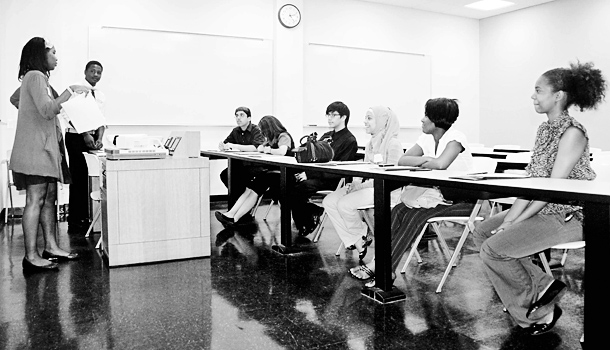
In her sophomore year at Chicago's ACE Technical Charter High School, Kewauna Lerma had a 2.25 GPA. Yet when Jeff Nelson met Kewauna, he knew she was capable of getting into and graduating from a four-year college. Nelson is the cofounder and Executive Director of Urban Students Empowered (US Empowered), a not-for-profit organization dedicated to college preparedness and college persistence (keeping students in college once they have enrolled) for low-income high school students.
"If you spent 10 minutes talking with one of our students, you would be absolutely convinced that they have everything it takes to get to and through college," Nelson says. But, "If you look at the data, you'll see that the reality of the trajectory for them to get there is incredibly unfair."
There has been fierce debate about the causes of the problems as well as what the best solutions might be to address our arrested public school education system, which is almost universally recognized as being in crisis. Hundreds of organizations collectively spend more than $4 billion dollars working on education reform. In 2010, the documentary film Waiting for Superman helped achieve more widespread public awareness about the challenges in the education reform process itself. There has never been so much attention from politicians, celebrities, social entrepreneurs, and not-for-profits around education. Even in bitterly divided Washington, some politicians from both parties have been able to agree in principle on certain elements of reform plans.
Yet even with so much focus on education reform and so much support for taking urgent action to respond to the crisis, it often seems that very little is actually getting done. This is especially true at the level of the high school to college transition, since most of the focus on educational reform is on how to get students to graduate from primary and middle schools and to keep them in high school without dropping out. Comparatively little attention has been given to preparing students, especially the less privileged and less affluent, for the day that some of them actually begin their freshman year of college. For those students, the challenges remain daunting. Once this demographic enters college, the risk of dropping out is high. In the Chicago Public Schools, only 18% of students enroll in four-year universities and just 7% graduate from college by age 25.
 Enter Jeff Nelson, a 30-year-old Chicago native who first saw the need for a focus on college persistence as a Teach for America Corps member, teaching sixth grade at O'Keeffe Elementary School on Chicago's South Side. It was there where he opened the newspaper and saw that alarming graduation statistic (at the time it was 6%). Nelson recalls thinking, "I had 32 students. I did the math and figured that about two of them would graduate with a four-year college degree. It was atrocious."
Enter Jeff Nelson, a 30-year-old Chicago native who first saw the need for a focus on college persistence as a Teach for America Corps member, teaching sixth grade at O'Keeffe Elementary School on Chicago's South Side. It was there where he opened the newspaper and saw that alarming graduation statistic (at the time it was 6%). Nelson recalls thinking, "I had 32 students. I did the math and figured that about two of them would graduate with a four-year college degree. It was atrocious."
So he got to work. "To be a true education reformer, you need a unique combination of incredible tenacious persistence and humble patience. You're trying to solve a vast problem, and you have to do it in a way that maintains quality," Nelson says. He started with excellent teachers. US Empowered recruits the right teachers to serve as mentors, coaches, and instructors to get high school kids prepared to think about college, understand their options for going to college, and what kind of academic work they have to accomplish to get there. These teachers are some of the best full-time teachers in their schools, and by leading US Empowered as an in-school, credit-bearing course, the college prep work is not an extra burden on teachers already over burdened with their day-to-day responsibilities. To find the teachers who will lead their program in a given school, US Empowered gets recommendations from their "human capital partners," including Teach for America, Chicago Foundation for Education, Academy for Urban School Leadership, Chicago Teaching Fellows, and the Golden Apple Foundation.
The experienced teachers who implement the US Empowered program lead the effort to build college readiness into the academic curriculum, meeting with students 40 minutes every day. The course starts during the students' junior year in high school and is focused on getting students to reach the academic standards necessary to have a high probability of getting into a college. The program is operating in high school environments that typically lack resources, including college-oriented advisors and guidance counselors, and have low rates of success in having their students go on to college. US Empowered also helps students understand how to make college a reality, how to get prepared, how to obtain financial aid, and other critical questions. But the program does not stop there: During their first year of college, the students in the program are required to continue participating in online support courses. US Empowered finds ways to continue to connect the college student to his or her US Empowered support network, so that they can get additional help if they need it. This attribute of the program is particularly important to keeping students in college once they have gone through the challenging obstacle course of getting to college in the first place.

Nelson believes college persistence is more important than ever. The economy has shifted aggressively towards higher value services and knowledge worker jobs. Ten years ago, increased high school graduation was viewed as a primary goal of the education reform movement. Today, while that goal remains, the shift in the economy means that a high school diploma alone is not much of a determinant for a bright future. "All of us in education want the same thing, we want the kids we teach or the kids we serve to have the choice to live a happy, healthy, productive life," Nelson says. "It's that simple."
Part of what inspired Nelson to go into this particular aspect of education reform was a sense that the college persistence issue was solvable and measurable. Nelson says that US Empowered has tried to operate as entrepreneurially as possible starting from the organization's inception: "We've been focused on outcomes from day one. We started with very clear measurable outcomes we wanted to achieve, then we built strategies to execute on those goals. I think that backwards planning really increases our effectiveness." Although US Empowered only operates in 11 Chicago-area high schools, it can boast that 98% of its students have been admitted to four-year colleges, and 85% of their students are currently persisting in college. One of those who US Empowered helped to succeed was Kewauna Lerma. As a result of her work in the US Empowered program, her GPA improved by 41%. She was accepted at Western Illinois University, where she is currently studying pre-medicine.
US Empowered has been operating in Chicago since 2007, and has garnered high praise from the educators that they work with. Tony Pajakowski the Co-Principal at Perspectives-Calumet High School of Technology, describes the US Empowered program as a "huge win," adding that "our kids are thriving with the individual attention the program provides, giving them a new perspective on what we mean by 'college for certain.'"

With successes under US Empowered's belt in Chicago, and after developing an extensive five-year strategic plan, this month US Empowered expanded outside of Chicago for the first time, launching a new program in Houston. Following Houston, US Empowered plans to continue expanding, with a goal of having programs in four to five cities in the country by 2017. This fall will be particularly busy for Nelson, as he will also become a father for the first time in August. Nelson says that this development made his work even more personal. "When I became an expectant father, I noticed how similar the goals we have for US Empowered students are to the goals I have for my child. It's fundamental to who we are as people," he says. He remains laser focused on meaningful and measurable education reform, especially now that he is contemplating the educational system his own children will find when they reach school age.
David D. Burstein is a young entrepreneur, having completed his first documentary 18 in '08. He is also the founder & executive director of the youth voter engagement not for profit Generation18. His book about the millennial generation will be published by Beacon Press in early 2013.